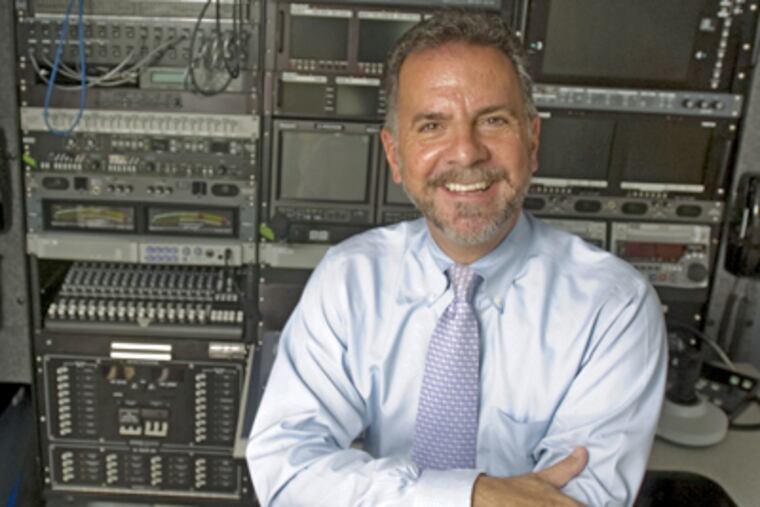Marrazzo pay up 6% in '08, but total compensation down
WHYY chief executive officer and president William J. Marrazzo received a 6 percent bump in salary for the year ending June 30, 2008, though his total compensation, including benefits, declined sharply, according to the station's most recent federal tax filing.

WHYY chief executive officer and president William J. Marrazzo received a 6 percent bump in salary for the year ending June 30, 2008, though his total compensation, including benefits, declined sharply, according to the station's most recent federal tax filing.
Marrazzo's salary rose from $415,993 to $441,386 year over year, according to WHYY's Form 990, which the IRS requires nonprofits to file each year. WHYY released the document publicly this week.
His overall compensation, including benefits and expenses, was $528,800, a drop of $211,290 from the preceding year's reported package of $740,090. That package made Marrazzo the country's highest-paid local public broadcasting executive, when compared with other stations' tax filings.
That $740,090 package included $280,000 in deferred compensation payable July 1, 2009, if Marrazzo met certain performance standards.
Marrazzo met those standards but relinquished some of the deferred compensation, WHYY board chairman Jerry Sweeney said.
In a statement, Marrazzo said: "This year's global economic decline is a new world for all of us. These conditions made it a simple decision to take voluntary steps around my personal compensation to help strengthen the organization."
Sweeney did not specify how much of the deferred compensation Marrazzo gave up. Marrazzo also has waived some future merit and performance payments, according to Sweeney and WHYY spokesman Art Ellis. In all, Sweeney said, Marrazzo is forgoing about $200,000.
"Bill's a responsible CEO. Responsible CEOs recognize the realities of the moment," Sweeney said.
Asked about the salary increase, Sweeney said the board felt Marrazzo merited it because he had strengthened the station in tough economic times.
"Our objective is to make sure WHYY is in the vanguard of public media," said Sweeney, who is president and CEO of Brandywine Realty Trust. "You cannot do that with mediocre management."
Sandra Miniutti of the nonprofit watchdog group Charity Navigator, which has been critical of Marrazzo's salary, said it was difficult for nonprofit boards to "justify any [pay] increases right now."
Marrazzo was not the only WHYY staff member to get a raise for the year ending in June 2008. Ellis said the station gave a total of $193,679 in merit increases to other employees.
The disclosure of Marrazzo's pay raise comes five weeks after the station laid off 16 full-time workers and one part-timer, saving about $1.2 million. Sweeney said that move was to cut costs and to follow the station's new strategic direction as a "regional digital news and information service."
It is difficult to know how Marrazzo's most recent pay package compares with compensation at other public broadcasters. Most of the public broadcasting outlets in the 10 largest TV markets have not yet released their tax forms.
Marrazzo's compensation exceeds that at two stations that have released figures. Laura Walker, CEO and president of WNYC Radio in New York, made $508,520 in pay and benefits, while Sharon Percy Rockefeller, head of the Washington area's WETA TV and radio stations, earned $438,005.
Overall, Sweeney said, the station was in a good position strategically and financially. In the year ending last June, the station had $30.6 million in revenue, up from $29.9 million, and $29 million in expenses, up from $28 million the year before.
The station ended the year with its fourth consecutive surplus, $1.6 million, down from $1.8 million the preceding year.
The amount spent on programming rose from $18.3 million to $19.7 million, which, Sweeney said, reflected WHYY's goal of increasing local productions.
The station's tax form also shows that the region's major public broadcasting outlet spent more on fund-raising - because, Sweeney said, it is having to work harder for donations in a constricted economy. WHYY spent $7.2 million on fund-raising in the year ending June 2008, about a quarter of its expenses, up from $6.7 million.
"It's definitely on the higher side, even for a public broadcasting charity," a category that generally spends more on fund-raising than other nonprofit groups, said Miniutti, vice president of marketing for Charity Navigator.
Sweeney said the station was having to work hard to court individuals and smaller businesses as foundation and corporate giving declined. He said the station's fund-raising costs were dropping, based on a per-dollar cost for revenue raised.